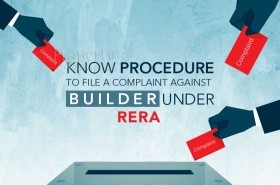Everyone can use a jump-start in one of their most significant lifetime investments, i.e. while buying a home. To engage more homebuyers towards their projects, Developers are offering attractive financial funding schemes to purchasers and investors to provide instalment adaptability and reduce the burden on buyers. Similar to mortgage finance, they came up with a new strategy as the "Interest Subvention Scheme". This scheme is intended towards promoting more buyers with buy a home now, pay later agenda.
What is Interest Subvention Scheme?
Before the initiation of the project, builders get approved bank loans from individual banks to ease the mortgage process to buyers. The plan enabled the purchasers to book the property by paying 5% to 20% of the sum, in advance. The purchasers did not need to pay EMIs until the occupancy of the apartments. Instead, the builders used to pay the EMIs in the interest of the borrowers, until a period that was indicated in the agreement or till the date of ownership.
The Interest Subvention Scheme was heavily promoted and was most opted by the buyers. As the buyers who reside in rented homes, they get to claim a house without any need to pay regularly scheduled payments (EMIs) as their home is being constructed. Likewise, since the builder needs to pay the interest, he has a motivating force to complete work on scheduled time. This more beneficial for the buyers, who face problems with project deliveries.
Prior, the banks used to pay the total residual cash to the builder. But this has been changed when RBI passed a rule stating that banks need to link the payments according to the construction status. But, in critical times, with banks not lending, the Subvention Scheme has been used to provide funds to the builders at a low rate.
What is the National Housing Bank (NHB's) Order on Interest Subvention Scheme?
Interest Subvention Scheme was a marketing tool to attract home buyers. But, when the markets are coming down, developers were not able to accept this fact and were using this scheme by indirectly offering discounts on the projects.
While in some instances, where the homebuyers are troubled by builders not delivering the project on the specified time frame or not paying the EMIs as per the scheme. According to the interest subvention scheme under RERA, the authority claims the power to decide on the complaints raised by the buyers if any frauds had been committed by the builders. As per the scheme under RERA, home buyers also possess the legal rights to file complaints against the fraud builders.
As the days go by, these subvention schemes went in the wrong direction, and they were also given on ready stock, while it was given earlier for under-construction projects. Fundamentally, it will low down the demand for under-construction projects where there is a lack of confidence in buyers for the project completion.
To constraint, some of the fraud complaints committed by builders under this scheme, in July 2019 National Housing Bank (NHB) proposed that housing finance companies (HFCs) cease from offering bank loans under interest subvention scheme, wherein the builders pay interest for the construction period instead of the home buyer for a specified period. Since this scheme is exposing HFCs and buyers to additional risk in the non-completion of the project.
As indicated by NHB, it has gotten a few objections concerning interest subvention plans and asserted abuse of the program by manufacturers. Worth referencing here is that under this scheme, in the event that the developer neglects to make intrigue instalment in the development time frame, at that point it will influence the financial assessment of homebuyers as the credit is issued on his name. So, this raised the trust issues of homebuyers. While the plan was induced on the first to encourage them, this was an adverse effect of the scheme.
Impact of the Ban on Interest Subvention Scheme on Builders
Cutback of Funding Source
Subvention advances are a less expensive and feasible option of financing for developers, as these credits are issued dependent on the payment of the purchaser and it isn't reflected anything on the builder's side. On the off chance that developers would raise subsidizing to finish an undertaking alone, at that point, they need to pay higher interest rates than regular basic home loan prices. Along these lines, stopping this plan will reduce the primary source of the less expensive subsidizing for manufacturers.
Reduced Profits
A few builders and specialists had kept the expense of capital, without Interest Subvention Scheme plans, will increment insignificantly (by about 1.5%) and subsequently, diminish their net revenues. Be that as it may, builders can come up by expanding other income streams, for example, improvement charges, amenities charges, preferrable location charges, and so on., to retain this expanded expense. Temporarily, though they see a drop in their project sales, which may prompt a further decrease in costs. While this may profit the market and end-clients over the long haul. But this will create a difficult situation for small developers and financial lenders.
Depletion in Investors
The Interest Subvention Scheme used to lessen the instalments required to be paid by homebuyers and their advance adjusting costs also. But, due to banning this scheme, homes being sold under subvention plans will additionally get rid of many financial investors from purchasing homes. As many builders were using this scheme as a promotional marketing strategy, mainly in metropolitan cities, they will be much effected as the buyer's interest will be reduced as they get fewer benefits.
Builder's Liquidity
The move is relied upon to put further strain on the developer's liquidity circumstance, which is as of now in a problematic situation. With the help of this scheme, builders resort to attract purchasers and raise assets for development. This plan facilitated homebuyer's advance adjusting obligation for a stipulated period and guaranteed deals for them.
Conclusion
While it is said that this move will be cynical for many property deals that are close to term, as speculated it isn't relied upon to be a noteworthy disturbance. Some significant builders are offering their own-funded subvention schemes to engage their present customers. It is still hoped by many builders that RBI will remove the ban on the Interest Subvention Scheme as a relief to genuine builders.
Get to know more such real estate updates at PropertyAdviser.in, India's first-ever property directory that can furnish you with the complete information on Hyderabad real estate.
By Govi















